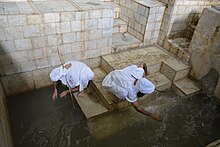In Mandaeism, tamasha or ṭamaša (Classical Mandaic: ࡈࡌࡀࡔࡀ, romanized: ṭmaša) is an ablution ritual that does not require the assistance of a priest.[1] Tamasha is performed by triple immersion in river (yardna) water. It is performed by women after menstruation or childbirth, men and women after sexual activity or nocturnal emission, touching a corpse, or any other type of defilement (ṭnupa[2]).[3][4] It is also performed after subsiding from unclean thoughts or anger at another person.[5]

Rishama is another type of ablution performed by Mandaeans, in which the face and limbs are washed (similar to the wudu in Islam). However, unlike the tamasha, it does not involve full-body immersion in water. The rishama and tamasha ablution rituals, which do not require priestly assistance, are distinct from masbuta, which needs to be performed by a priest.[5] Whereas the tamasha is a "self-immersion" in which devotees dip themselves into the water, during the masbuta, devotees need to be immersed into water by a priest, not by themselves.[6]
The tamasha ablution is comparable to tevilah in Judaism and ghusl in Islam.
See also
edit- Rushma
- Ablution in Christianity
- Five Seals in Sethianism
References
edit- ^ Gelbert, Carlos (2005). The Mandaeans and the Jews. Edensor Park, NSW: Living Water Books. ISBN 0-9580346-2-1. OCLC 68208613.
- ^ Nasoraia, Brikha H.S. (2021). The Mandaean gnostic religion: worship practice and deep thought. New Delhi: Sterling. ISBN 978-81-950824-1-4. OCLC 1272858968.
- ^ Häberl, Charles (2022). The Book of Kings and the Explanations of This World: A Universal History from the Late Sasanian Empire. Liverpool: Liverpool University Press. p. 16. doi:10.3828/9781800856271 (inactive 1 November 2024). ISBN 978-1-80085-627-1.
{{cite book}}: CS1 maint: DOI inactive as of November 2024 (link) - ^ Mandaean Awareness and Guidance Board (28 May 2014). "Mandaean Beliefs & Mandaean Practices". Mandaean Associations Union. Retrieved 26 November 2021.
- ^ a b Buckley, Jorunn Jacobsen (2002). The Mandaeans: ancient texts and modern people. New York: Oxford University Press. ISBN 0-19-515385-5. OCLC 65198443.
- ^ Lupieri, Edmundo (2001). The Mandaeans: The Last Gnostics. Wm. B. Eerdmans Publishing. ISBN 9780802833501.